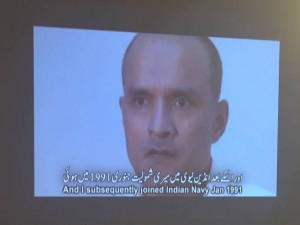Syeda Mazhar

Yadav went on to add that he was picked by RAW towards the end of 2013. “Ever since I have been directing various activities in Balochistan and Karachi at the behest of RAW and deteriorating law and order situation in Karachi,” he revealed. He reported to Anil Kumar Gupta, the Joint Secretary RAW. Not only did he tipped off the Pakistani authorities about other RAW agents working within Pakistan to weaken the country and cause mayhem but, he also claimed that he was not confessing under duress or any sort of pressure. He preferred to “come clean” about what he has been doing for the past 14 years.
Kulbhushan Yadav proudly accepted to be affiliated with the Indian Navy, also admitting to be playing a major role in conspiring against the China Pakistan Economic Corridor – a project abhorred by the Indian State. The presence of the hostile elements in Pakistan has been suspected since a long time. Last year Pakistan’s permanent representative to the United Nations, Maleeha Lodhi handed over the evidence to UN Secretary General Ban Ki-moon of India’s direct involvement in the internal affairs as well as terrorist events within Pakistan.
Subsequent to the arrest, the Information Minister Parveiz Rashid dispelled the impression that Prime Minister Nawaz Sharif has not appropriately taken up the issue of Yadav with the Indian government “we have conveyed our concerns to India through the diplomatic channel. The Prime Minister knows his responsibility,” he added.
Foreign Office summoned Indian High Commissioner Gautam Bambawale and lodged a strong protest. Bambawale was called upon a day after Yadav’s arrest in Balochistan. Foreign Ministry’s statement described the incident as the “illegal entry into Pakistan by a RAW officer and his involvement in subversive activities in Balochistan and Karachi.” Nafees Zakaria on Thursday said that the issue will be raised on every forum internationally including United Nations.
In a rather unusual response, India not only acknowledged that the arrested man was an Indian national, but also that he is a former military officer. The alleged Last month, Kulbhushan Yadav, an Indian Navy Officer was caught in Balochistan, confessed that the Indian Intelligence Agency RAW and the government is actively participating in destabilizing Pakistan by inciting and supporting the Baloch separatist insurgency.
“RAW is involved in some activities related to the Baloch liberation movement within Pakistan and the region around it,” Yadav revealed in the six minute video released at a joint news conference by Information Minister Pervaiz Rashid and Director General Inter Services Public Relations Lt. Gen. Asim Saleem Bajwa. Describing the arrest of Yadav as a “big achievement”, Lt. Gen. Bajwa said the Indian spy’s confessional statement proved that India was sponsoring terrorism in Pakistan.
Person was said to be holding an Indian passport that was issued to Hussein Mubarak Patel. However, the ministry of external affairs spokesperson denied allegations that he was a spy for the Indian external intelligence agency. “The said individual has no link with government since his premature retirement from Indian Navy. We have sought consular access to him,” said MEA spokesperson Vikas Swarup. He added that India has “no interest in interfering in internal matters of any country and firmly believes that a stable and peaceful Pakistan is in the interest of all in the region”.
However, Indian side has yet to release the name of the “said individual [who] has no link with government since his premature retirement from Indian Navy” – for example, whether he is called Kulbhushan Yadhav, Hussein Mubarak Patel or some other name. His date of retirement from the navy has also not been made public.
Pakistan being a state at constant war against terrorism has always been apprehensive about India. Time and time against concerns were raised against India’s intentions for eradicating terrorism from the region and more so its role in weakening Pakistan internally as well as externally. The news of the arrest has been effectively lost in the media due to a whirlwind of dark events that followed the arrest. Most prominent one was the bomb blast in Lahore right after the arrest or perhaps in the wake of the arrest. Lahore attack consequently raised trepidations about the operation against terrorism. In the same week, the capital city of Pakistan, Islamabad went into a siege by Qadri’s protestors and the government seemed to be absent.
Commentators in the Pakistani media have long believed that India’s national security adviser, Ajit Doval, is a proponent. While the latest arrest will provide grist to that mill, it is not clear how far Pakistan will take matters. In the past, Pakistani officials have hinted at an Indian hand in not just the Balochi separatist movement – which is directed at the Pakistani military – but also in major terrorist attacks against civilians. If the arrest of Yadav/Patel is used to argue Indian involvement in atrocities like the attack on the Army Public School in Peshawar or even the Safoora massacre, bilateral relations are likely to take a hit.
Skirmishes on the border, attacks on the Durrand Line, instability in Karachi – the economic hub of Pakistan prevented Yadav from reaching the limelight. Nobody asked about the status of a spy caught inside our country-a spy from a country which was apprehensive about a “Pakistani pigeon.”



